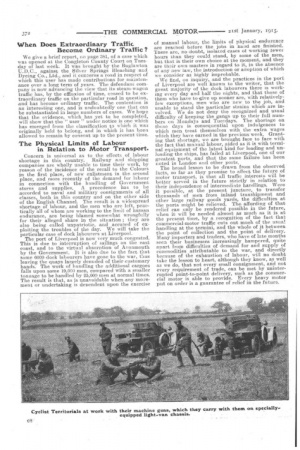The Physical Limits of Labour in Relation to Motor Transport.
Page 2

If you've noticed an error in this article please click here to report it so we can fix it.
Concern is universal as to the effects of labour shortage in this country. Railway and shipping companies are wholly unable to time their work, by reason of the incidence of the recall to the Colours in the first place, of new enlistment in the second place, and more recently of the demand for labour in connection with the handling of Government stores and supplies. A precedence has to be accorded to naval and military consignments of all classes, both in this country and on the other side of the English Channel. The result is a widespread shortage of labour, and the men who are left, practically all of whom are working to the limit of human endurance, are being blamed somewhat wrongfully for their alleged share in the situation ; they are also being. called -unpatriotic, and accused of exploiting the troubles of the day. We will take the particular case of dock labourers at Liverpool.
The port of Liverpool is now very much congested. This is due to interruption of aailings on the east coast, and to the virtual absorption of Avonmouth by the Government. It is also due to the fact that some 6000 dock labourers have gone to the war, thus leaving the quays largely denuded of their customary hands. The work of handling the additional cargoes falls upon some 19,000 men, compared with a smaller tonnage to be handled by 25,000 men at normal times. The result is that, as is unavoidable when any movement or undertaking is dependent upon the exercise
of manual labour, the limits of -physical endurance are reached before the jobs in hand are finished. There are, no doubt, isolated cases of working fewer hours than they could stand, by some of the men, but that is their own choice at the moment, and they are their own masters in regard to it, in the absence of any new law, the introduction or atioption of which we consider as highly improbable.
We find, on inquiry, and the practices in the port of Liverpool are well known to the writer, that the great majority of the dock labourers there is working every day and half the nights, and that those of them who have to give up sooner are, with relativelyfew exceptions, men who are new to the job, and unable to stand the particular strains which are involved. We do not deny the recognized and usual difficulty of keeping the gangs up to their full numbers on Mondays and Tuesdays. The shortage on these days is consequential upon indulgences to which men treat themselves with the extra wages which they have earned in the previous week. Granting that shortage, we are brought face to face with the fact that manual labour, aided as it is with terminal equipment of the latest kind for loading and unloading the ships, has failed at Liverpool, one of our greatest ports, and that the same failure has been noted in London and other ports. The broad lesson to be drawn from the observed facts, so far as they promise to affect the future of motor transport, is that all traffic interests, will be better served in the future strictly in relation to their independence of intermediate handlings.. Were it possible, at the present juncture, to transfer thousands of men from inland transhipment and other large railway goods yards, the difficulties at the ports might be relieved. The. affording of that relief can only be rendered possible in the future, when it will be needed almost as much as it is at the present time, by a recognition of the fact that commercial-motor traffic cuts out much of the usual handling at the termini, and the whole of it between the point of collection and the point of delivery. Many importers and traders, who fiave of late months seen their businesses increasingly hampered, quite apart -from difficulties of demand for and supply of commodities attributable to the war, and directly because of the exhaustion of labour, will no doubt take the lesson to heart, although they know, as well as we do, that not every small consignment, and not every requirement of trade, can be met by uninterrupted point-to-point delivery, such as the commercial motor is able to provide. Every heavy motor put on ander is a guarantee of relief in the future.


















